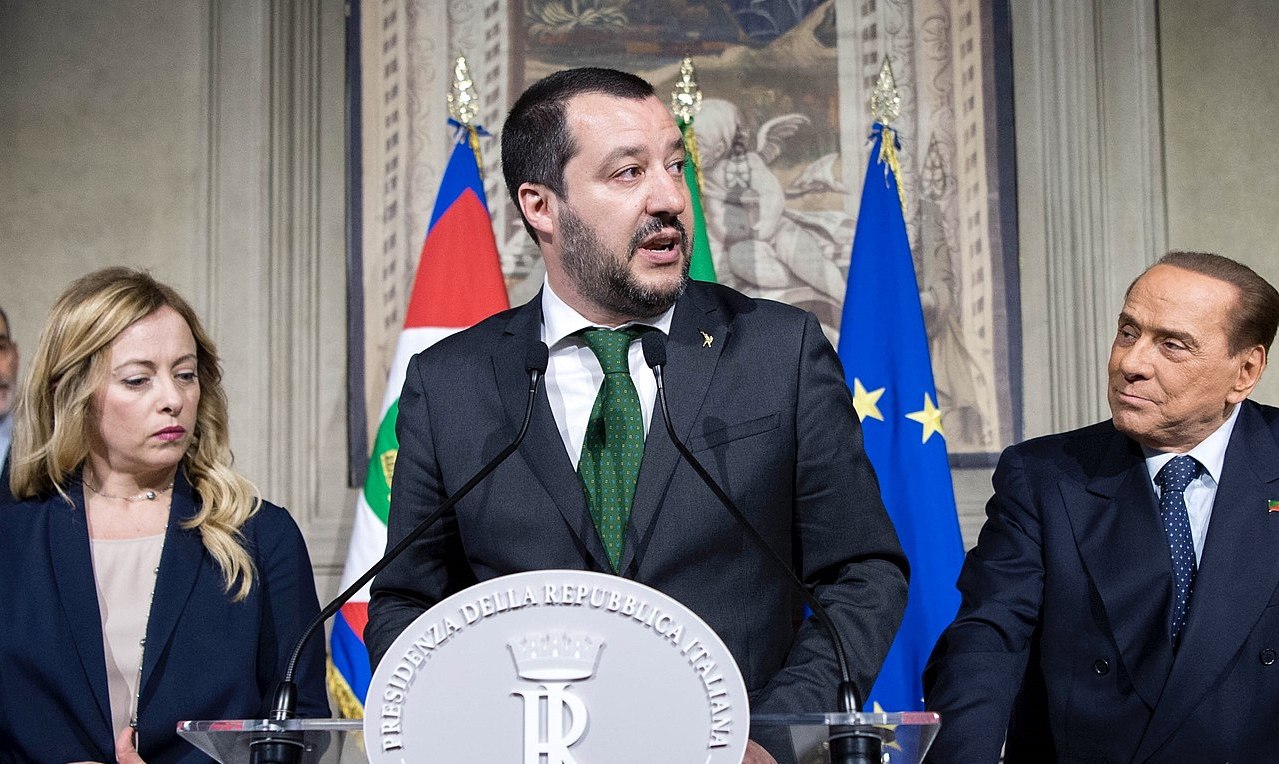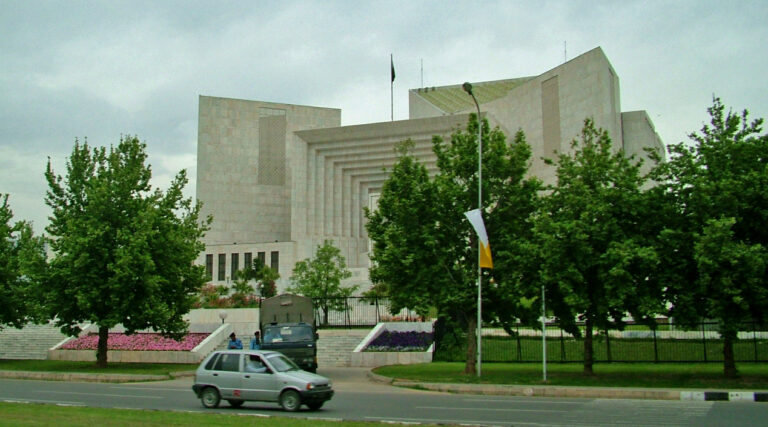
Politics Of Identity And Exclusion: Italy’s Matteo Salvini And The Rise Of Pan-European Christian Nationalism
Thomas Jared Farmer
Giorgia Meloni, Matteo Salvini and Silvio Berlusconi, Wikimedia Commons (Attribution: Presidency of the Italian Republic).
This article is part of our series on Transnational Christian Nationalism, and its impact on politics, the rule of law, and religious freedom. If you’d like to explore other articles in this series, click here.
Rightwing Politics in Italy: From Christian Democracy to Berlusconi
For decades following WWII, Italian politics was largely dominated by the rivalry between the center-Right, Catholic-inspired, Christian Democracy Party (Democrazia Cristiana, or “DC”), and the Italian Communist Party (Partito Comunista Italiano, or “PCI”). Throughout this time, however, the DC had an effective monopoly over coalition leadership. Aside from a brief period of compromise between the two groups from 1976-1980, the PCI was perennially in the opposition. From 1981 to 1991, the DC led a coalition of five major political parties (the so-called “Pentapartito”), while the PCI, excluded from power, finally dissolved itself amidst the ongoing collapse of the Soviet Union. In 1992, however, a far-reaching political scandal embroiled the Pentapartito effectively destroying its members. The so-called “Bribesville” (Tangentopoli) affair, and the judicial investigation which followed it, revealed endemic corruption across nearly all of Italian politics. The resulting fallout led to widespread disillusionment with the existing party structure.
When news broke of the scandal, the former members of the PCI had already been in the process of reorganizing themselves into a new party, the Democratic Party of the Left (PDS). With the mainstream political establishment now in ruins, the PDS, untainted by the controversy, seemed poised to be swept to electoral victory for the first time in the upcoming 1994 elections. In response to concerns amongst many within the political Center and Right of a “communist takeover,” the billionaire media mogul, Silvio Berlusconi, quickly formed a new ad hoc anti-communist party, “Go Italy!” (Forza Italia). Cobbling together smaller regional coalitions—including those from the previously marginalized far-Right—Berlusconi was able to win an unexpected victory, bringing into power what was, at the time, Italy’s most conservative government since World War II. Furthermore, the vacuum created by the implosion of the traditional parties cleared the way for the rise of a new kind of media-driven “personality politics” initiated by the media-savvy Berlusconi. Even though his official positions more or less reflected his support for center-Right policies advocated by the majority of the Catholic hierarchy, his lack of emphasis on a political program in favor of pure spectacle disrupted the traditional relationship which had existed between Italian Catholicism and Italian politics during the heyday of the DC.
Despite his garishness, frequent scandals, and own eventual charges of corruption, Berlusconi would prove to be a durable figure in Italian politics—ultimately serving in several roles over the course of his long career—including as a member of both the upper and lower houses of Parliament, a member of the European Parliament, as well as, the longest-serving postwar Prime Minister in the nation’s history. As a twice-divorced, well-known philanderer, who grabbed international headlines for his “bunga bunga” sex parties, Berlusconi seemed an unlikely champion of traditional religious values. Even so, he often cited his catholic upbringing and prudently kept close ties with conservative prelates such as Cardinal Giovanni Battista Re and Cardinal Camillo Ruini. Conversely, whatever his personal conduct may have been, Berlusconi’s official positions on matters related to issues such as same-sex marriage, IVF, surrogacy, euthanasia, and public funding for religious schools, all more or less reflected views in line with both Catholic leadership and the center-Right parties of the time. This gave even those conservatives who disapproved of his private life, a permission-structure to hold-their-noses and support him anyway.
With the absence of the ideological stability formerly associated with the DC (as the catchall Catholic Party), the political mantel for Catholic leadership in more recent years has seemed less clear. “Go Italy!” was always irrevocably tied to Berlusconi, who had little interest in cultivating a political organization apart from himself or designating a clear political successor to his movement when he was gone. With declines in his political fortunes (Berlusconi was convicted of tax-fraud in 2013 and temporarily banned from seeking public office), the Party had already begun to lose support to newer political parties even prior to his death in 2023. Concomitantly, the Catholic Church under the leadership of Pope Francis has placed much less emphasis on the culture war issues which previously galvanized religious sentiment during the papacies of both John Paul II and Benedict XVI. As a result, conservative elements within the country have begun to look elsewhere for direction, with some even looking to a political figure like Valdimir Putin, rather than the Pope, as an ideal example of Christian leadership. As in the United States, two issues in particular have driven recent debates across much of Europe, including Italy. Those issues are (1) gender/sexuality, and (2) immigration. In both instances, these debates ultimately concern identity and thus also carry with them strong religious undertones.
Fears of Replacement: Forces Driving the Politics of the New Far-Right
Gender/Sexuality
With regards to gender/sexuality, the rise of independent ultraconservative Catholic movements, such as ProVita & Famiglia and Generazione Famiglia, has influenced the political landscape in Italy, particularly through their anti-gender campaigns conducted under the guise of pro-family rhetoric. These groups have gained traction by opposing progressive measures, organizing large-scale events like “Family Day,” and leveraging support from far-Right parties such as Lega (“The League”)—formerly known as Lega Nord (“The Northern League”), prior to its rebranding in 2018—and Fratelli d’Italia (“Brothers of Italy,” or FdI). In 2019, with the support of populist Lega leader, Matteo Salvini, The World Congress of Families (WCF) held its thirteenth-annual convention in Verona. The WCF is an U.S.-based organization, which has been labeled by the Southern Poverty Law Center as an anti-gay hate-group. Since their establishment in 1997, WCF has gained increasing support not only in the U.S., but also in Russia, as well as, several European and African countries. Despite claims of non-political stances, these organizations often align with radical-rightwing figures like Salvini and engage in campaigns against progressive legislation, such as the Zan Bill, which aimed to protect LGBTIQA+ rights.
With the absence of a strong center-Right alternative and the increasing (though certainly not complete) depoliticization of the Church under Francis, figures such as Salvini and Prime Minister Giorgia Meloni (FdI) have successfully positioned themselves as defenders of traditional Catholic values and Italian identity. Meloni, in particular, has proven adept in recent years at navigating political shifts, out-maneuvering other conservative leaders and positioning FdI to become the leading party within the national right-wing coalition. At a rally in 2019, for example, she famously introduced herself by saying, “I am Giorgia, I am a woman, I am a mother, I am Italian, I am Christian, and no one will take that away from me!” She became Prime Minister of Italy in 2022 and later received a broad mandate for her right-wing agenda following the 2024 European elections. Even while concerns persist over her party’s historic ties to fascism, since gaining power, Meloni has made a concerted effort to soften the image of FdI, attempting to stabilize the notoriously erratic Italian political system, and notably moderating her positions on Euroscepticism, NATO, and the Russian invasion of Ukraine. This has even led Luca Ozzano to suggest that Meloni is seeking to fill the political space once occupied by the DC. Importantly, this has created ideological space to her Right, which has largely been occupied by Salvini, who currently serves as her Interior Minister and Vicepremier.
Immigration
The second issue contributing to Italy’s rightward political drift, can be viewed through the lens of an ongoing legal battle involving Salvini himself, arguably the politician who has done the most to make immigration a pressing national issue. On October 6, 2024, Minister Salvini, was in Pontida for the 36th annual gathering of his Lega Party. At the event, he was joined on stage by members of the EU Parliament’s now third largest group, the far-right “Patriots for Europe.” Notably, the event which was advertised under the “Trumpian” banner #MEGA (Make Europe Great Again!), featured speaking slots for ultranationalist leaders such as, Viktor Orbán (Hungary), Geert Wilders (Netherlands), and André Ventura (Portugal). Also in attendance at the gathering were Marlene Svazek of the Freedom Party of Austria (FPÖ), José Antonio Fúster of Spain’s VOX Party, as well as, members of the Czech ANO party. Jordan Bardella of France’s National Rally Party and former Brazilian President, Jair Bolsonaro, also sent video messages. This event, was not only the first public meeting of the leaders of the Patriots group since its formation earlier this year, but it was also a show of support for Salvini himself, who is currently facing kidnapping charges in Palermo, Sicily.
The criminal charges stem from a 2019 decision Salvini made in his capacity as then-Interior Minister (in the Conte government) to prevent a Spanish ship—operated by the humanitarian NGO “Open Arms,” which was carrying 147 African migrants—from landing in Lampedusa, a small Mediterranean island about 20 miles off the coast of Tunisia. The rescue ship had picked up the migrants off the coast of Libya and attempted to dock on the island—the furthest Italian territory from mainland Italy—before being blocked by the Italian government. At Salvini’s direction, the ship remained at sea for nearly three-weeks, with sanitation conditions aboard rapidly deteriorating, eventually leading to an outbreak of scabies amongst its passengers. Some migrants eventually dove overboard in desperation, before a court-order finally permitted them to safely disembark. For his part, Salvini claims that he was simply doing his job by defending state border-sovereignty from an invasion by illegal migrants (citing his homeland defense obligations under Article 52 of the Italian Constitution). He argued further that, “Thanks to my government’s actions, landings, deaths, and disappearances in the Mediterranean Sea decreased.” Furthermore, “This Spanish ship was never prevented from going anywhere, except to Italy. We could no longer be the refugee camp for all of Europe.” Prosecutors, by contrast, cite provisions of the International Convention on Maritime Search and Rescue (SAR), arguing that Salvini’s actions constituted a violation of the human rights of those he deliberately left stranded aboard.
If convicted, Salvini could be barred from holding office and sentenced to six-years in prison. In response to the charges, Meloni took to X (formerly Twitter) to forcefully defend Salvini, stating: “It is unbelievable that a minister of the Italian Republic risks six years in prison for doing his job of defending the nation’s borders, as required by the mandate received from the citizens. Turning the duty to protect Italy’s borders from illegal immigration into a crime is a very serious precedent. Minister Salvini has my full solidarity.” She was quickly joined in support by Tesla CEO, Elon Musk, who argued it was the prosecutors themselves that deserved prison time. A defiant Salvini himself also posted on X, stating: “I would do it all again: defending borders from illegal immigrants is not a crime.”
Amongst the international far-Right, Salvini’s prosecution risks transforming him into a martyr in the culture wars over “identity” and “belonging” taking place in many Western countries. At the event in Pontida, for example, Orbán declared, “We shall not surrender our country, we shall not let them change our culture. [It] is our home and we want to feel at home in it.” Austria’s Svazek asked the assembled crowd, “Is this the Europe we want? A Europe that betrays and abandons its own culture and identity? No! I want to tell the story of a strong Europe, with deep roots and the ability to make clear decisions, like Matteo Salvini did by prioritizing his country’s security and defending European values.” In his speech, Portugal’s Ventura argued that Europe was under siege from the “cancer” of Islamic extremism, but assured his listeners that, “They cannot stop the Holy Alliance of European peoples.” In his remarks, Dutch leader Wilders praised Salvini as a “virtuous man” who was fighting against the “tsunami of mass illegal immigration that is making us foreigners in our own homes.” Finally, in his own comments before the assembled crowd, Salvini praised former U.S. President Donald Trump and called for the establishment of a “pan-European network of nationalist parties.” If his message was at all unclear, Salvini chose the date of the event to coincide with the naval Battle of Lepanto (1571), in which the fleet of the Holy League of Catholic states defeated the forces of the Ottoman Empire.
This is, of course, nothing new. In the past, Salvini has promoted the Great Replacement Conspiracy Theory and warned against the impending “Islamization” of Europe. Echoing other far-Right Christian Nationalists, he is no stranger to using religion as a political cudgel. Referring to himself as the “last of the good Christians,” Salvini and those like him, view Christianity as inseparable from their own western chauvinistic goals. The consequence of such positioning, however, is a rising tide of politically and religiously motivated violence. During the 2018 Italian general elections, for example, Salvini and his Party were accused of cultivating an intensely anti-immigrant and anti-Muslim public sentiment across Italy. This led to an increase in attacks and acts of intimidation, particularly against black Italians—the most notorious instance being the 2018 Macerata shooting carried out by Luca Traini, a member and former local candidate for the Lega Party, in which six innocent African immigrants were shot and seriously wounded in retaliation for the murder of Pamela Mastropietro. Significantly, Salvini’s League continues to forge far-right alliances and take hardline stances, even as Meloni’s FdI has continued to soften some of its positions. Salvini’s continued support for Vladimir Putin and his bid to remain politically relevant by aligning with the Patriots group (as his own party declines in domestic vote shares when compared to the FdI) may ultimately risk putting him at odds with Meloni, who currently heads the more moderate European Conservatives and Reformists Party (ECR) in the EU.
Concluding Remarks
Democratic backsliding in the U.S. and Europe is edging the West towards a precipice from which it will soon either be forced to pull back or plunge headlong. As we have seen, elements within the far-Right in Italy and elsewhere have used the valence of Christianity to elevate the crises and uncertainties of the present to cosmic proportions. The belief that one is involved in a battle for the soul of their nation from the threat of “barbarians at the gate,” offers a powerful motivation to support leaders or take actions which might otherwise be seen as incongruous with the teachings of Jesus of Nazareth. While there are any number of valid criticisms which one could offer of Atlanticism and the post-War hegemony of the United States in global affairs, this slide into illiberalism arguably only bolsters the power of oligarchs and autocrats, while simultaneously threatening the very institutional mechanisms by which ordinary members of the public (and, in particular, its most vulnerable) are able to seek justice, remedies, or reform.

Thomas Jared Farmer is the McDonald Scholar in Residence at the Center for the Study of Law and Religion at Emory University. He holds a BA in Philosophy from the University of Illinois, an MTS and Th.M. from Emory University’s Candler School of Theology, an MA in Philosophy as well as an MA in Religion from Claremont Graduate University and a PhD in the Philosophy from the University of Münster (Westfälische Wilhelms-Universität Münster).
Recommended Citation
Farmer, Jared Thomas. “Politics Of Identity And Exclusion: Italy’s Matteo Salvini And The Rise Of Pan-European Christian Nationalism.” Canopy Forum, November 1, 2024. https://canopyforum.org/2024/11/01/politics-of-identity-and-exclusion-italys-matteo-salvini-and-the-rise-of-pan-european-christian-nationalism/.
Recent Posts










